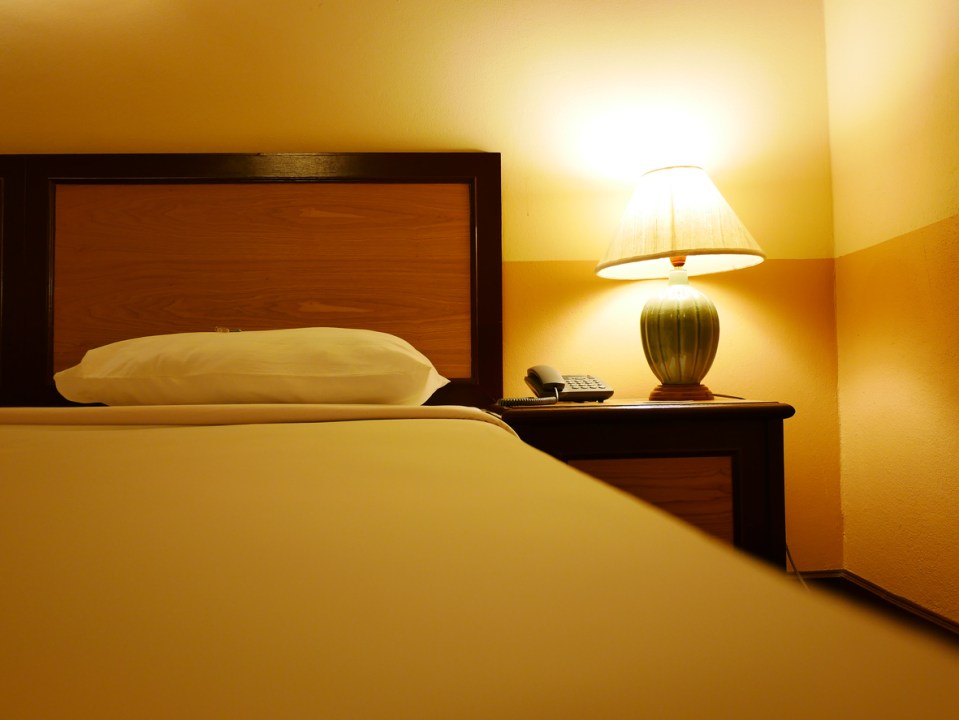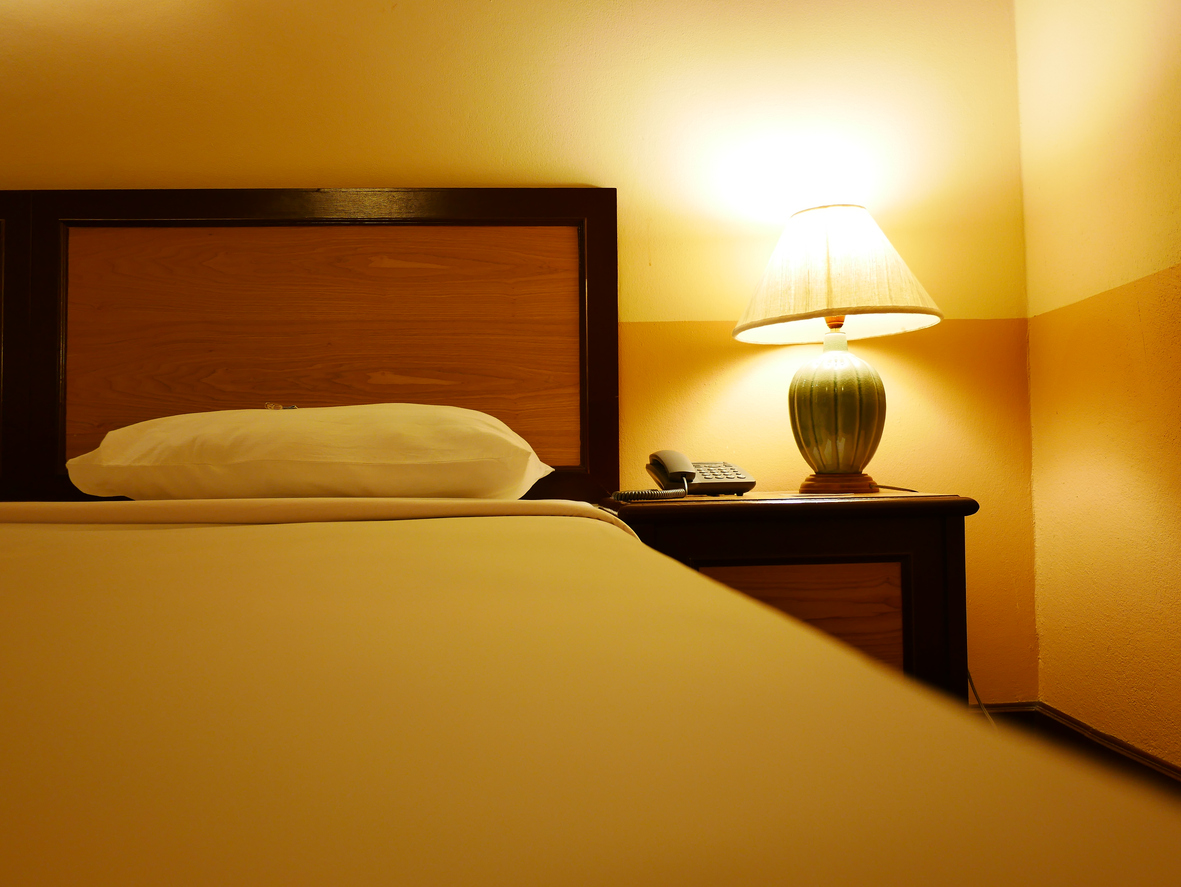I belong to a generation of foreign correspondents whose first move, on entering a hotel room, was not to turn down the bed or to check (hopefully) for hot water, but to examine the phone, screwdriver in hand. Could you detach it from its socket? Could you open it up to get at the wiring? Did you have a compatible adaptor, and even if you did, could the line transmit data back to your editor in London?
The rooms had recently been redone, according to the owner’s redesign, and this entailed removing the tables
There were more than a few times when I whisked my long-suffering husband out of an otherwise more than acceptable hotel back on to the rain-drenched road in pursuit of communications. Things were sometimes simpler in the old communist bloc, where a word with the concierge and the guardian of a switch-cupboard might produce a long-distance phone line, where officially there was none. There was a time when French phone plugs had an additional bar that indicated a data use. Mobile phones, wifi and mini-laptops have transformed that particular scene, with the worst surprise – in most of the world at least – being a hefty extra charge for wifi in your room, something I encountered most recently in Edinburgh.
This does not mean, however, that hotels have not found other ways to introduce unpredictability where there should be none. I sometimes wonder how hard it can actually be to provide a bed, a functioning bath or shower, some electric sockets and a light bright enough to read by. Among simple things commonly lacking, I would list hooks or rails for towels and clothes and a TV with a decipherable remote control. I’m not demanding the Ritz. And by the way, I would also take a kettle over a capsule coffee machine any day.
But these hoteliers, they have their ways, and on a recent trip over land down the north-eastern flank of the European Union, I encountered quite a few. The most original, though, was in Bratislava, the capital of Slovakia – a country that has made the news recently (and not in a good way) for an assassination attempt on its Prime Minister and cuts to its support for Ukraine. For reasons I find hard to divine, hotels in Bratislava are both fewer and more expensive than you might think (the two probably not being unrelated). And among the few options available, I knew I was probably making the wrong choice.
On the edge of the old town, with a garden, a lift, a kettle in the room, and what was lauded in reviews as an excellent breakfast, what could go wrong? Personally, I’m not that fussed about breakfast, but a garden sounded nice (even if my arrival was the cue for a two-week heatwave to be extinguished in a rain storm). There were foreseeable drawbacks, the first being a long walk from the taxi along cobbles – then again, that’s atmospheric and what else would ‘edge of the old town’ suggest? The second was that having a lift isn’t the same as being step-free.
But it was the third that floored me. A cursory glance around the room registered the basics – bed, chair, clothes rail. a low shelf, a very high shelf, and an old-ish TV. Then I realised that there wasn’t anywhere at all that could be repurposed to write on – and believe me, I’m a dab hand at necessity and invention. Ah, said the receptionist, when I went to ask about a table. The rooms had recently been redone, according to the owner’s redesign, and this entailed removing the tables. But if I really, really wanted one, well… And she took me up to the landing, where there was a whole pile of the rejected tables, one of which could fortunately be squeezed into my room.
When I gently suggested that I might not be unique as a hotel guest in rather expecting a hotel room to have a table, or something of the kind, this was clearly a helpful hint too far. She would pass that on to the owner, but the owner was very pleased with her re-design. The problem, in other words, was mine. Which indeed it was. I had probably chosen a hotel geared to leisure rather than work. But it was still the first time in long years of travel that I could remember there being no table, or writing surface of any kind. There was, though, a light switch by the bed, for which I was duly grateful.
Lighting has been a common complaint over the years and it has now come full circle. Once, I had to suffer the lowest of low-wattage bulbs in Ceausescu’s Romania. Today’s dingy apology for illumination that is explained as the hotel’s contribution to ‘reaching net zero’.
It is not only the green agenda that has given us hotel rooms where you cannot read other than from a back-lit screen, however. There is also atmospherics, where the number of light bulbs or lamps is in inverse proportion to the intensity of light diffused.
I laboured for more than a day in a cabin-like hotel room in Manhattan under the impression that the gloom was a part of the super-hip vibe, only to glimpse another room that was as bright as day. It turned out that there was a concealed switchboard for adjusting the mood to your preferences. The drawback is that to do this, you need to master something akin to a pilot’s manual just to switch on the lights.
One of the otherwise more modern and practical hotel rooms I stayed in recently in Poland had the electricity sockets tastefully concealed beneath a ledge on the bed’s headboard. Little stickers pointing to their existence suggested that early guests might have had difficulty finding them. Locating them was one thing, however; using them – quite another. Have you tried to insert a plug upside down into a space you cannot see into? I rather suspect that the designers hadn’t either.
My general experience is that French chain hotels generally get more of these things right than others, or at least less wrong. My favourite innovations in recent years have been the little bedside spotlights that are now quite common; a large reading light essentially on a rod that could be slid between the desk and the bed. And my all-time favourite? A port-hole between the bathroom and the bedroom at just the right height that allowed you to watch television from the bath.








Comments